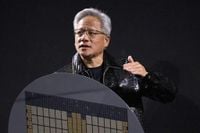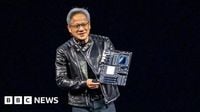In a significant move reflecting the ongoing tensions between the United States and China, Jensen Huang, the CEO of Nvidia, pledged on April 17, 2025, to make "all efforts" to meet the burgeoning demand for chips in China. This declaration came during a high-stakes meeting with officials from the Chinese Ministry of Commerce in Beijing, just after the U.S. implemented new export controls on advanced semiconductor technology.
Nvidia, a leader in the global market for artificial intelligence (AI) chips, has found itself at the crossroads of international trade dynamics, with 20% of its revenue stemming from sales to China. Huang's visit to Beijing was not only timely but also critical for Nvidia's future in a market that has become increasingly vital for its operations.
During his discussions, Huang met with Ren Hongbin, president of the China Council for the Promotion of International Trade, and also reportedly spoke with Vice Premier He Lifeng and Liang Wenfeng, the founder of the Chinese AI company DeepSeek. "We will continue collaborating with our Chinese partners and exploring ways to comply with regulations, without compromising the supply of our products," Huang stated, as reported by state media.
The backdrop of Huang's visit is filled with escalating U.S. restrictions on the export of advanced chips to China, aimed at safeguarding national and economic security. The U.S. Commerce Department has mandated that Nvidia will require licenses to export its H20 AI chip to China, a regulation expected to remain in effect for the "indefinite future." This shift in policy signals Washington's intent to curb China's technological advancements, particularly in the military sector.
In recent years, Nvidia has emerged as a pivotal player in the race for AI supremacy between the U.S. and China. The company's chips are crucial for generative AI applications, which have seen a surge in demand worldwide. In November 2023, Nvidia briefly surpassed Apple as the largest company globally by market capitalization, underscoring its significance in the tech landscape.
However, the new export controls have raised concerns for Nvidia. The company is anticipating losses of approximately $5.5 billion from outstanding orders it can no longer fulfill due to the U.S. restrictions. Major Chinese technology firms, including Tencent, Alibaba, and ByteDance, have expressed strong interest in Nvidia's chips, further complicating the situation.
Chim Lee, a senior analyst at the Economist Intelligence Unit in Beijing, noted that while alternative AI chips are being developed in China by companies like Huawei, they currently lag behind Nvidia's offerings. Lee remarked, "It will introduce challenges to China's AI scene, but it won't massively slow down China's AI development and deployment." This sentiment reflects the nuanced landscape of global technology competition.
Huang's trip to China comes at a time when the country's market holds immense potential for Nvidia. Last year, China accounted for 13% of Nvidia's total sales, a figure that, while lower than the nearly 50% attributed to the U.S., still represents a significant revenue stream. Huang's meetings were seen as an effort to solidify Nvidia's standing in China amid the tightening restrictions.
In discussions with He Lifeng, the Chinese Vice Premier, Huang was informed that "China's market investment and consumption potential is huge," highlighting the opportunities that still exist in the region. Furthermore, during talks with Shanghai's mayor, Huang reaffirmed his commitment to the Chinese market, indicating that Nvidia aims to navigate the complexities of international trade while maintaining its presence in this critical economy.
The export controls are part of a broader strategy by the U.S. government to de-risk supply chains for advanced technology away from China and to encourage semiconductor production domestically. In a related development, Nvidia announced plans to invest up to $500 billion in AI server infrastructure within the U.S., a move that reflects its commitment to bolstering its capabilities on home soil.
Additionally, Taiwanese semiconductor manufacturer TSMC, which produces chips for Nvidia, disclosed plans to invest an extra $100 billion in advanced manufacturing facilities in Arizona. This investment is indicative of a wider trend in the tech industry, where companies are increasingly polarized between the U.S. and China, leading to a more fragmented global landscape.
As the U.S. continues to tighten its grip on technology exports to China, the implications for companies like Nvidia are profound. The tech industry is witnessing a shift towards two distinct systems, one dominated by the U.S. and the other by China, as highlighted by Gary Ng, a senior economist at Natixis. "Tech will be less global in that sense, and it will be subject to more restrictions," Ng stated, emphasizing the challenges ahead.
In conclusion, Jensen Huang's visit to China underscores the delicate balance Nvidia must maintain as it navigates the complex interplay of international trade and technology competition. With significant stakes in both markets, the company's future hinges on its ability to adapt and innovate amid changing geopolitical landscapes.



